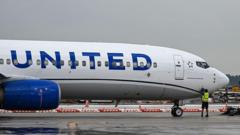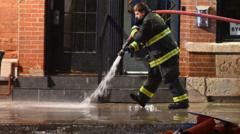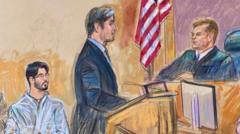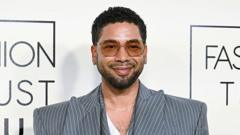Pope Leo XIV, an American, is set to lead the global Catholic community amidst evolving traditions.
Historic Moment: An American Becomes Pope Leo XIV

Historic Moment: An American Becomes Pope Leo XIV
The election of Robert Prevost marks a significant shift for the Catholic Church.
In a remarkable event that has sent shockwaves through the Catholic community, Robert Prevost was elected as the new pope, taking on the papal name Leo XIV. This historic election unfolded yesterday, and he addressed a jubilant crowd gathered at St. Peter’s Square, proclaiming, “Peace be with you.” The election of an American pope is a departure from longstanding traditions that have historically favored European candidates.
According to Jason Horowitz from our Rome bureau, this change indicates a shifting landscape within the Vatican: “In a world that seems upside down, old taboos are also breaking,” he noted, reflecting on how the idea of an American pope was once seen as unthinkable.
The papal conclave, comprising cardinals from around the world, concluded its deliberations in just over a day. With the new pope at the helm, he faces the pivotal task of deciding whether to adhere to the progressive agenda of his predecessor, Pope Francis, who advocated for inclusivity and reform, or to forge a new path for the Church in a rapidly changing world.
Born in Chicago, the 69-year-old pontiff spent considerable time abroad, particularly in Peru, where he served for two decades as a missionary, parish priest, teacher, and bishop. Elevated to cardinal by Pope Francis less than two years prior, Leo XIV has been involved in significant Vatican operations, managing the selection and oversight of bishops globally.
As he embarks on this new role, Leo XIV is distinguished by his commitment to social issues, prioritizing the needs of the poor and migrants, echoing some of the values championed by Pope Francis. However, it remains uncertain how his approach will align with issues related to LGBTQ+ Catholics, comparing it to his predecessor's more inclusive stance.
Looking ahead, Leo XIV will celebrate Mass at the Sistine Chapel with the cardinals who chose him, and is scheduled to recite a public prayer at St. Peter's Basilica on Sunday. On Monday, he plans to meet with journalists at the Vatican, offering insights into his vision for the Church moving forward.
According to Jason Horowitz from our Rome bureau, this change indicates a shifting landscape within the Vatican: “In a world that seems upside down, old taboos are also breaking,” he noted, reflecting on how the idea of an American pope was once seen as unthinkable.
The papal conclave, comprising cardinals from around the world, concluded its deliberations in just over a day. With the new pope at the helm, he faces the pivotal task of deciding whether to adhere to the progressive agenda of his predecessor, Pope Francis, who advocated for inclusivity and reform, or to forge a new path for the Church in a rapidly changing world.
Born in Chicago, the 69-year-old pontiff spent considerable time abroad, particularly in Peru, where he served for two decades as a missionary, parish priest, teacher, and bishop. Elevated to cardinal by Pope Francis less than two years prior, Leo XIV has been involved in significant Vatican operations, managing the selection and oversight of bishops globally.
As he embarks on this new role, Leo XIV is distinguished by his commitment to social issues, prioritizing the needs of the poor and migrants, echoing some of the values championed by Pope Francis. However, it remains uncertain how his approach will align with issues related to LGBTQ+ Catholics, comparing it to his predecessor's more inclusive stance.
Looking ahead, Leo XIV will celebrate Mass at the Sistine Chapel with the cardinals who chose him, and is scheduled to recite a public prayer at St. Peter's Basilica on Sunday. On Monday, he plans to meet with journalists at the Vatican, offering insights into his vision for the Church moving forward.



















